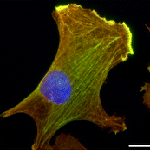γ-Actin plays a key role in endothelial cell motility and neovessel maintenance
Main Article Content
Abstract
Background
Angiogenesis plays a crucial role in development, wound healing as well as tumour growth and metastasis. Although the general implication of the cytoskeleton in angiogenesis has been partially unravelled, little is known about the specific role of actin isoforms in this process. Herein, we aimed at deciphering the function of γ-actin in angiogenesis.Methods
Localization of β- and γ-actin in vascular endothelial cells was investigated by co-immunofluorescence staining using monoclonal antibodies, followed by the functional analysis of γ-actin using siRNA. The impact of γ-actin knockdown on the random motility and morphological differentiation of endothelial cells into vascular networks was investigated by timelapse videomicroscopy while the effect on chemotaxis was assessed using modified Boyden chambers. The implication of VE-cadherin, VEGFR-2 and ROCK signalling was then examined by Western blotting and using pharmacological inhibitors.Results
The two main cytoplasmic isoforms of actin strongly co-localized in vascular endothelial cells, albeit with some degree of spatial preference. While β-actin knockdown was not achievable without major cytotoxicity, γ-actin knockdown did not alter the viability of endothelial cells. Timelapse videomicroscopy experiments revealed that γ-actin knockdown cells were able to initiate morphological differentiation into capillary-like tubes but were unable to maintain these structures, which rapidly regressed. This vascular regression was associated with altered regulation of VE-cadherin expression. Interestingly, knocking down γ-actin expression had no effect on endothelial cell adhesion to various substrates but significantly decreased their motility and migration. This anti-migratory effect was associated with an accumulation of thick actin stress fibres, large focal adhesions and increased phosphorylation of myosin regulatory light chain, suggesting activation of the ROCK signalling pathway. Incubation with ROCK inhibitors, H-1152 and Y-27632, completely rescued the motility phenotype induced by γ-actin knockdown but only partially restored the angiogenic potential of endothelial cells.Conclusions
Our study thus demonstrates for the first time that β-actin is essential for endothelial cell survival and γ-actin plays a crucial role in angiogenesis, through both ROCK-dependent and -independent mechanisms. This provides new insights into the role of the actin cytoskeleton in angiogenesis and may open new therapeutic avenues for the treatment of angiogenesis-related disorders.Article Details
How to Cite
PASQUIER, Eddy et al.
γ-Actin plays a key role in endothelial cell motility and neovessel maintenance.
Vascular Cell, [S.l.], v. 7, n. 1, p. 2, feb. 2015.
ISSN 2045-824X.
Available at: <https://vascularcell.com/index.php/vc/article/view/10.1186-s13221-014-0027-2>. Date accessed: 21 feb. 2026.
doi: http://dx.doi.org/10.1186/s13221-014-0027-2.
Section
Original Research

